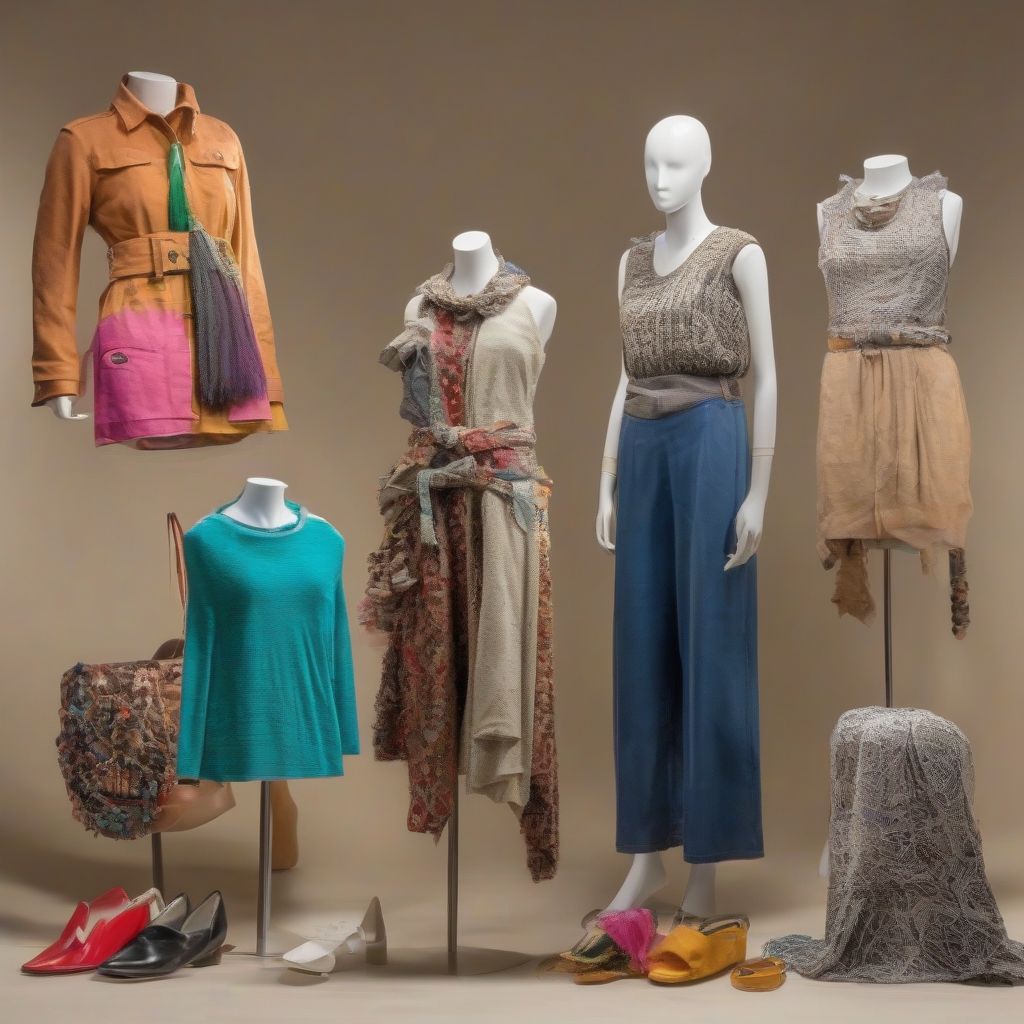Have you ever stopped to think about where your clothes come from and where they end up? The fashion industry, while stylish and exciting, has a dirty little secret: it’s a major polluter. But here’s the good news: sustainable fashion made from recycled materials is changing the game, offering a way to look good, feel good, and do good all at the same time.
What is Sustainable Fashion Made from Recycled Materials?
Sustainable fashion, at its core, is about minimizing the environmental impact of the fashion industry. It’s about making conscious choices about the clothes we wear, choosing quality over quantity, and supporting brands that prioritize ethical and eco-friendly practices.
Recycled materials play a huge role in this movement. Instead of relying solely on virgin resources, sustainable fashion utilizes materials that have been given a second life. Think discarded plastic bottles transformed into cozy fleeces, pre-loved garments reborn as trendy patchwork designs, or industrial waste spun into innovative new fabrics.
The Benefits of Choosing Recycled Materials
The positive impact of choosing recycled materials in fashion is multifold:
- Conservation of Resources: Using recycled materials reduces the demand for virgin resources like water, energy, and raw materials, helping to protect our planet’s precious resources.
- Reduced Pollution: The production of virgin materials often involves harmful chemicals and generates significant pollution. Recycling drastically minimizes these negative environmental impacts.
- Waste Reduction: Recycling helps divert waste from landfills, where it can take hundreds of years to decompose and release harmful greenhouse gases.
- Innovation and Style: The use of recycled materials is driving exciting innovation in textile development, leading to unique and stylish fabrics that are both sustainable and high-performing.
Popular Recycled Materials Used in Fashion
The fashion world is getting creative with recycled materials, turning what was once considered waste into fashion-forward pieces:
Recycled Polyester (rPET)
One of the most common recycled materials in fashion is recycled polyester, also known as rPET. Made from recycled plastic bottles and other PET plastics, rPET is a versatile fabric used in everything from activewear and outerwear to swimwear and accessories.
Did you know? Choosing a recycled polyester jacket over one made from virgin polyester can save up to 75% less energy and significantly reduce CO2 emissions.
Recycled Cotton
Cotton is a beloved natural fiber, but conventional cotton production can be incredibly water-intensive and rely heavily on pesticides. Recycled cotton, made from pre-consumer cotton scraps or post-consumer garments, helps mitigate these negative impacts.
Recycled Wool
Warm, durable, and naturally biodegradable, wool is a fantastic material. Recycled wool takes things a step further by using pre-consumer scraps or old wool garments to create new yarn, saving energy and resources in the process.
Recycled Nylon (Econyl)
Nylon is known for its strength and durability, making it a popular choice for activewear and swimwear. Econyl is a type of recycled nylon made from pre and post-consumer waste like fishing nets, carpets, and fabric scraps.
Other Innovative Recycled Materials
Beyond these common materials, the fashion industry is constantly exploring new and innovative ways to incorporate recycled content:
- Recycled Leather Alternatives: Made from materials like pineapple leaves, apple peels, and mushroom roots, these innovative materials offer a sustainable and ethical alternative to traditional leather.
- Recycled Cashmere: Old cashmere garments are carefully sorted, shredded, and respun to create new, luxurious yarn.
- Recycled Plastic Bottles: Beyond being transformed into rPET fabric, recycled plastic bottles are also being used to create innovative new materials like faux leather and even jewelry.
How to Spot Sustainable Fashion Made from Recycled Materials
Looking to incorporate more sustainable fashion into your wardrobe? Here are a few tips to help you spot brands and products that prioritize recycled materials:
- Check the Labels: Look for labels that specifically mention recycled content, such as “made from recycled plastic bottles” or “100% recycled cotton.”
- Look for Certifications: Certifications like the Global Recycled Standard (GRS) and the Recycled Claim Standard (RCS) ensure that products meet specific recycled content and traceability requirements.
- Research Brands: Many brands now highlight their sustainability initiatives on their websites, including information about their use of recycled materials.
- Ask Questions: Don’t be afraid to reach out to brands directly to ask about their sourcing practices and commitment to sustainability.
Making a Difference with Your Wardrobe
 Sustainable Fashion Products Made From Recycled Materials
Sustainable Fashion Products Made From Recycled Materials
Choosing sustainable fashion made from recycled materials is a powerful way to make a positive impact on the planet. It’s about making conscious choices that align with our values and supporting brands that are committed to creating a more sustainable and ethical fashion industry.
[amazon bestseller=”sustainable fashion”]
The Future of Fashion is Sustainable
The fashion industry is at a turning point. Consumers are becoming increasingly aware of the environmental and social impact of their clothing choices, and they’re demanding better. The rise of sustainable fashion made from recycled materials is a testament to this shift in consciousness. By embracing recycled materials, supporting ethical brands, and advocating for change, we can all be a part of creating a more stylish and sustainable future for fashion. What steps will you take to make a difference? Share your thoughts and join the conversation below!
